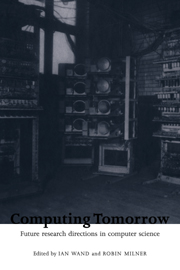Book contents
- Frontmatter
- Contents
- Preface
- Contributors
- 1 The Complexity of Algorithms
- 2 Building Novel Software: the Researcher and the Marketplace
- 3 Prospects for Artificial Intelligence
- 4 Structured Parallel Programming: Theory meets Practice
- 5 Computer Science and Mathematics
- 6 Paradigm Merger in Natural Language Processing
- 7 Large Databases and Knowledge Re-use
- 8 The Global-yet-Personal Information System
- 9 Algebra and Models
- 10 Real-time Computing
- 11 Evaluation of Software Dependability
- 12 Engineering Safety-Critical Systems
- 13 Semantic Ideas in Computing
- 14 Computers and Communications
- 15 Interactive Computing in Tomorrow's Computer Science
- 16 On the Importance of Being the Right Size
- References
- Index
6 - Paradigm Merger in Natural Language Processing
Published online by Cambridge University Press: 10 December 2009
- Frontmatter
- Contents
- Preface
- Contributors
- 1 The Complexity of Algorithms
- 2 Building Novel Software: the Researcher and the Marketplace
- 3 Prospects for Artificial Intelligence
- 4 Structured Parallel Programming: Theory meets Practice
- 5 Computer Science and Mathematics
- 6 Paradigm Merger in Natural Language Processing
- 7 Large Databases and Knowledge Re-use
- 8 The Global-yet-Personal Information System
- 9 Algebra and Models
- 10 Real-time Computing
- 11 Evaluation of Software Dependability
- 12 Engineering Safety-Critical Systems
- 13 Semantic Ideas in Computing
- 14 Computers and Communications
- 15 Interactive Computing in Tomorrow's Computer Science
- 16 On the Importance of Being the Right Size
- References
- Index
Summary
Abstract
This article considers the major change that has taken place in natural language processing research over the last five years. It begins by providing a brief guide to the structure of the field and then presents a caricature of two competing paradigms of 1980s NLP research and indicates the reasons why many of those involved have now seen fit to abandon them in their pure forms. Attention is then directed to the lexicon, a component of NLP systems which started out as Cinderella but which has finally arrived at the ball. This brings us to an account of what has been going on in the field most recently, namely a merging of the two 1980s paradigms in a way that is generating a host of interesting new research questions. The chapter concludes by trying to identify some of the key conceptual, empirical and formal issues that now stand in need of resolution.
Introduction
The academic discipline that studies computer processing of natural languages is known as natural language processing (NLP) or computational linguistics (the terms are interchangeable). NLP is most conveniently seen as a branch of AI, although it is a branch into which many linguists (and a few psycholinguists) have moved. In Europe, NLP is dominated by ex-linguists but this is not the case in the USA where there is a tradition of people moving into the field from a standard computer science background.
It is tempting to say that NLP is the academic discipline that studies computer processing of the written forms of natural languages. But that would be misleading. The discipline that studies computer processing of the spoken forms of natural languages is known as speech processin or just speech.
- Type
- Chapter
- Information
- Computing TomorrowFuture Research Directions in Computer Science, pp. 88 - 109Publisher: Cambridge University PressPrint publication year: 1996
- 2
- Cited by



